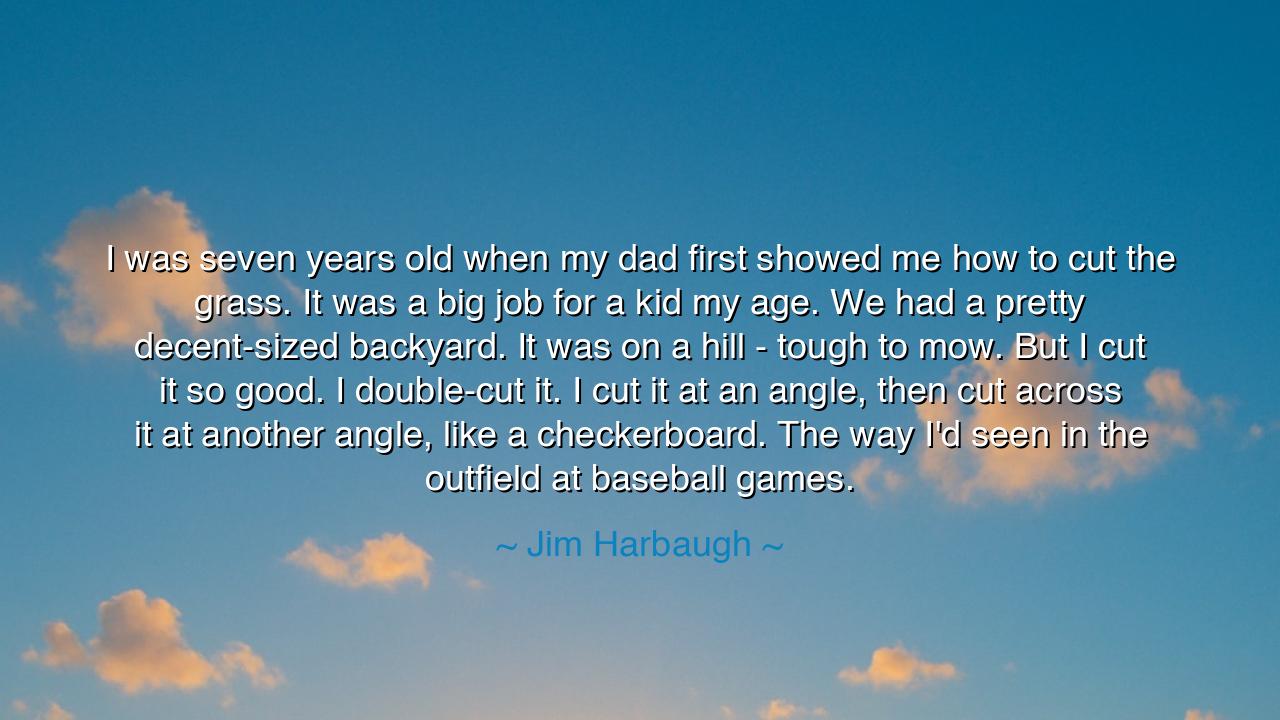
I was seven years old when my dad first showed me how to cut the
I was seven years old when my dad first showed me how to cut the grass. It was a big job for a kid my age. We had a pretty decent-sized backyard. It was on a hill - tough to mow. But I cut it so good. I double-cut it. I cut it at an angle, then cut across it at another angle, like a checkerboard. The way I'd seen in the outfield at baseball games.






“I was seven years old when my dad first showed me how to cut the grass. It was a big job for a kid my age. We had a pretty decent-sized backyard. It was on a hill — tough to mow. But I cut it so good. I double-cut it. I cut it at an angle, then cut across it at another angle, like a checkerboard. The way I’d seen in the outfield at baseball games.” — Jim Harbaugh
In this simple remembrance, Jim Harbaugh speaks of more than a childhood chore. He speaks of the birth of discipline, the awakening of pride in one’s work, and the shaping of character through humble labor. What seems at first to be a tale of mowing grass is in truth a parable of greatness — how the roots of excellence grow not in glory, but in small, quiet acts of care. The boy, guided by his father’s hand, learns not merely to cut the grass, but to master a craft, to see beauty in diligence, and to find joy in doing a thing well.
For the ancients too understood this truth: that greatness is forged in the furnace of small tasks well done. The farmer who tills his soil with devotion, the craftsman who shapes each stone with precision, the scribe who copies each line with patience — all serve a higher order. So when young Harbaugh mowed the hill behind his home, he was not merely trimming blades of grass; he was being initiated into the timeless brotherhood of those who labor with integrity. His checkerboard pattern, inspired by the perfection of baseball fields, was not vanity but vision — the mark of a soul that strives to turn even an ordinary task into something worthy of admiration.
And thus, the father becomes the first teacher, the yard the first field of battle. It is here the boy learns the great law: that the measure of a man is found not in the size of the task, but in the spirit with which he performs it. To cut the grass with pride is to prepare the heart for life’s steeper hills. Each pass of the mower teaches endurance; each bead of sweat teaches humility. The young Harbaugh, like the warriors of old, learns that mastery begins in the unseen — that the glory others witness later is born from the effort no one sees.
History gives us countless mirrors of this truth. Abraham Lincoln, before he became the voice of a divided nation, split rails and carried firewood as a boy. But he did it well, learning through every stroke of the axe that the value of work lies in the honesty of one’s hands. Leonardo da Vinci, before painting The Last Supper, spent years grinding pigments and preparing canvases for other men. In those long, silent hours of labor, he cultivated the discipline that would one day give birth to genius. So too with young Harbaugh — what began as cutting grass became the foundation for the relentless work ethic that would carry him to the gridiron, the sidelines, and the history books.
What this story teaches, dear reader, is that excellence is a habit, not a moment. The boy who cuts the grass as if it were a masterpiece will one day lead with the same devotion. The child who takes pride in small duties prepares himself for great ones. When Harbaugh cut his backyard into a checkerboard, he wasn’t seeking praise; he was honoring the unseen covenant of craftsmanship — the ancient belief that how you do a thing matters more than what you do.
Therefore, take heed of this wisdom: do not despise the small tasks that life places before you. Whether you sweep a floor, write a report, or train in silence, do it with excellence. The field may seem humble, but it is the training ground of destiny. The spirit that double-cuts the grass today will one day conquer the greater challenges of tomorrow. The hill that feels steep in youth becomes the mountain one is ready to climb in manhood.
And finally, remember: true greatness begins in obedience and effort, not in applause. Like the young boy who saw beauty in the outfield and sought to mirror it on his own hill, find your own field to perfect. Bring art into your labor, purpose into your duty, and love into your work. For the hands that learn to mow the grass with care will one day build, lead, and inspire — and the world will see in their deeds the quiet perfection first born in a simple backyard on a summer day.






AAdministratorAdministrator
Welcome, honored guests. Please leave a comment, we will respond soon